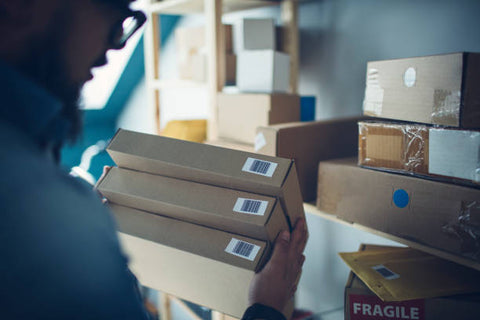
Why your small eCommerce business need implement barcode labels?
|
|
Time to read 4 min

Written by: Kelly Chen
|
|
Time to read 4 min
It would be almost difficult to say a business with stocked products that wouldn’t benefit from a barcode inventory management system. Do you eager to know barcodes and how they can affect your small business? Do you really need them? Nor every small business or eCommerce business needs to use barcodes. Service businesses don’t need to use them, because it looks a bit hard to stick a barcode on your service. But, if you sell products, you could probably benefit from using barcodes. If you manage large inventories, your use for barcodes is even more imperative.
Table of Content
Time is at a premium in a growing business, so it pays to operate as efficiently as possible. Start Barcode Labeling can help your small business to increase efficiency and save time and money.
The key advantage of using barcodes within a small business (or, in fact, any business) is time savings. Business owners and key staff often spend a lot of time entering SKUs into inventory management and accounting systems, frequently to the detriment of more productive business functions.
Barcodes also lessen the frequency of errors within the inventory record. As mistakes made when recording inventory information can contribute to missed sales, excess inventory or even inventory shortages, making fewer mistakes will have a direct impact on your business’ profitability and capacity to grow.
Without barcoding, it is much more complex to operate a real-time inventory management system. A real-time inventory management system enables you to manage your business’ entire supply chain from raw material ordering to distribution. Real-time inventory control also records and allocates costs at every stage, simplifying accounting and tax reporting.
In a small business, real-time inventory control is an essential business continuity tool. For example, without barcoding, if the staff member who processes inventory movements is backlogged, on leave or unavailable, there is a risk that the inventory record will not keep up with inventory levels in the warehouse.
Barcoding can also play an important role in a small business’ risk management strategy. For example, small food and beverage manufacturers are subject to the same food safety rules but have a lot less resourcing in the event that something goes wrong. Barcoding improves the accuracy of inventory records and can also be used to ensure traceability from raw materials to each batch of finished product. In the event of a recall or food safety issue, the use of barcodes can obviously reduce the administrative burden.
Barcoding will take your small business to the next level. Once you’ve determined that using barcodes would benefit your eCommerce business, then you need to know how you choose to print your barcodes. Below is a list of common printer types and how they will affect your barcodes.
If you have a laser printer and only need to print a few barcodes on a basic label, then using a laser printer is fine. However, they are definitely not suitable for mass production.
While inkjet printers are affordable, they should not be used for barcode printing because they canot provide a consistent level of quality that is needed when printing barcodes.
Thermal printers are the best choice for barcode printing, especially when using high-quality labels. Thermal printers easily replicate the exact width of each and every bar in the barcode and provide a high level of quality. Within the realm of thermal printers, there’s direct thermal and thermal transfer, which both offer a high print quality and scan rate.
As you can see, unless you only need a few barcodes printed, thermal printers are the way to go. They are reliable, precise, and efficient, taking all of the guesswork out of barcode printing.
If you are considering barcode labels for your business or you are a larger company already using them and would like them to be professionally prepared for you, please contact us: cs@betckey.com. We offer blank labels for those who want to print their own barcode labels, as well as printed ones that are ready to go and save you time.
If you want to buy thermal labels or sticker paper, you can check out more on our store
Products Featured In This Blog
I have not received the shipment. I emailed last week but no response. I tried customer service phone number and no response.
Our shipment arrived damaged so we had rolls missing, Betckey replaced it with a new case, so all in all we received 5 extra rolls. Thank you so much. Your replacement was beyond our expectations.
Good product and fast shipping
Dymo 30252 Compatible Address Labels 1-1/8" x 3-1/2"
The product was as described, the price was excellent and the service was great.






